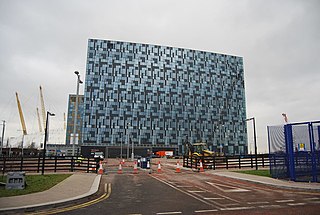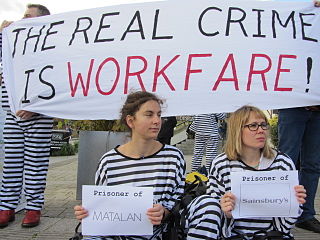Related Research Articles

The Solidarity Federation, also known by the abbreviation SolFed, is a federation of class struggle anarchists active in Britain. The organisation advocates a strategy of anarcho-syndicalism as a method of abolishing capitalism and the state, and describes itself as a "revolutionary union". In 1994 it adopted its current name, having previously been the Direct Action Movement since 1979, and before that the Syndicalist Workers' Federation since 1950.
The New Deal was a workfare programme introduced in the United Kingdom by the first New Labour government in 1998, initially funded by a one-off £5 billion windfall tax on privatised utility companies. The stated purpose was to reduce unemployment by providing training, subsidised employment and voluntary work to the unemployed. Spending on the New Deal was £1.3 billion in 2001.

The Ministry of Children, Community and Social Services is the ministry in Ontario, Canada responsible for services to children and youth, social services such as welfare, the Ontario Disability Support Program, and community service programs to address homelessness, domestic violence, spousal support, adoption, and assisted housing for people with disabilities. The current Minister of Children, Community and Social Services is Merrilee Fullerton.
Shaw Trust is a charitable organisation in the United Kingdom which supports people with complex needs into good work. It was founded in the village of Shaw in Wiltshire in 1982.

Sue Ryder is a British palliative, neurological and bereavement support charity based in the United Kingdom. Formed as The Sue Ryder Foundation in 1953 by World War II Special Operations Executive volunteer Sue Ryder, the organisation provides care and support for people living with terminal illnesses and neurological conditions, as well as individuals who are coping with a bereavement. The charity was renamed Sue Ryder Care in 1996, before adopting its current name in 2011.
The National Federation of Young Farmers' Clubs (NFYFC) is a rural youth organisation in the United Kingdom. The Federation covers various Young Farmers' Clubs (YFCs) throughout England and Wales, helping support young people in agriculture and the countryside. It does not include YFCs from Scotland or Ireland.

Teach First is a social enterprise registered as a charity which aims to address educational disadvantage in England and Wales. Teach First coordinates an employment-based teaching training programme whereby participants achieve Qualified Teacher Status through the participation in a two-year training programme that involves the completion of a PGDE along with wider leadership skills training and an optional master's degree.

The British Youth Council, known informally as BYC, is a UK charity that works to empower young people and promote their interests. The national charity, run by young people, exists to represent the views of young people to government and decision-makers at a local, national, European and international level; and to promote the increased participation of young people in society and public life. It is partly funded by the Department for Digital, Culture, Media and Sport and UK Parliament.
Work for the Dole is an Australian Government program that is a form of workfare, or work-based welfare. It was first permanently enacted in 1998, having been trialled in 1997. It is one means by which job seekers can satisfy the "mutual obligation requirements" to receive the Newstart Allowance, now replaced by the JobSeeker Payment. Other "mutual obligation" measures can include: accredited study, part-time work, Australian Army Reserves, and volunteer work.
The Coalfields Regeneration Trust is a registered charity that works across the former Coalfield communities of England, Wales and Scotland. The Charity was founded in 1999. The Coalfields Regeneration Trust receives funding from the Department of Communities and Local Government for their work in English communities, The Welsh Government for their Welsh activities and the Scottish Government to cover their Scottish work. The Trust runs a number of initiatives and activities that make things happen at a community level in Coalfield areas. Each Country sets its own strategic objectives in line with local priorities.
The New Year Honours 2008 for the Commonwealth realms were announced on 29 December 2007, to celebrate the year passed and mark the beginning of 2008.

Working Links was a British outsourcing subcontractor established in 2000 as a public, private and voluntary company that provided welfare services and help with employability. It was acquired by the investment group Aurelius in June 2016.
The Birthday Honours 2004 for the Commonwealth realms were announced on 11 June 2004 for the United Kingdom, New Zealand, the Cook Islands and elsewhere to celebrate the Queen's Birthday of 2004.
Queen's Birthday Honours are announced on or around the date of the Queen's Official Birthday in Australia, Canada, New Zealand, and the United Kingdom. The dates vary, both from year to year and from country to country. All are published in supplements to the London Gazette and many are formally conferred by the monarch some time after the date of the announcement, particularly for those service people on active duty.
Mandatory Work Activity (MWA) was a workfare programme in the United Kingdom whereby individuals had to work for their benefits or risk being 'sanctioned' and losing them. MWA started in May 2011, but in November 2015 the DWP confirmed it was "not renewing" it. An academic analysis by the Department of Work and Pensions cast doubt on the effectiveness of MWA, and despite finding "little evidence" that workfare improved claimants gaining paid employment, the DWP ignored the findings of the study, and in June 2012, the scheme received a £5m expansion. A similar but little-known scheme 'Jobseeker Mandatory Activity' (JMA) was piloted by New Labour in 2006, but did not last beyond 2008. JMA targeted those claimants 25 and over, who had been unemployed for 6 months or more and made claimants liable to 'sanction' for non-compliance.
The sector-based work academy programme is a UK government scheme launched in 2013, which is intended to help create a skilled workforce in a business sector. Sector-based work academies help prepare people receiving unemployment benefits to apply for jobs in a new or different area of work. Work placements take place, which are designed to meet the business's immediate and future recruitment needs as well as to recruit a workforce with the right skills to sustain and grow the company's business. SWAP is administered by Jobcentre Plus and available in England and Scotland. A sector-based work academy can last for up to 6 weeks.

Workfare in the United Kingdom is a system of welfare regulations put into effect by UK governments at various times. Individuals subject to workfare must undertake work in return for their welfare benefit payments or risk losing them. Workfare policies are politically controversial. Supporters claim that such policies help people move off welfare and into employment whereas critics argue that they are analogous to slavery or indentured servitude and counterproductive in decreasing unemployment.
The Work Programme (WP) was a UK government welfare-to-work programme introduced in Great Britain in June 2011. It was the flagship welfare-to-work scheme of the 2010–2015 UK coalition government. Under the Work Programme the task of getting the long-term unemployed into work was outsourced to a range of public sector, private sector and third sector organisations. The scheme replaced a range of schemes which existed under previous New Labour governments including Employment Zones, New Deal, Flexible New Deal and the now abolished Future Jobs Fund scheme which aimed to tackle youth unemployment. Despite being the flagship welfare-to-work scheme of the Conservative-led coalition government, and then the incumbent Conservative government from May 2015, the DWP announced, in November 2015, that it was replacing the Work Programme and Work Choice with a new Work and Health Programme for the longer-term unemployed and those with health conditions. The DWP also announced that it would not be renewing Mandatory Work Activity and Help to Work which included Community Work Placements.
Help to Work was a government workfare scheme in the United Kingdom for individuals who had not found work after two years on the Work Programme. Help to Work was the overall name for Community Work Placements and other intensified "activation" measures, and was launched at the start of 2014, but it was announced in November 2015, that the DWP was "not renewing" it. Referrals to Community Work Placements ended in March 2016, with contracts ending by October. All other referrals ended in March 2017.
The Queen's Award for Enterprise: Sustainable Development is awarded each year on 21 April by Queen Elizabeth II, along with the other two Queen's Awards for Enterprise categories.
References
- ↑ "Workfare placements must be made public, tribunal rules". TheGuardian.com . 19 May 2013.
- ↑ "Department for Work and Pensions names charities providing "workfare"".
- 1 2 3 4 5 6 7 8 9 10 11 12 13 14 15 16 17 18 19 20 21 22 23 24 25 26 27 28 29 30 31 32 33 34 35 36 37 38 39 40 41 42 43 44 45 46 47 48 49 50 51 52 53 54 55 56 57 58 59 60 61 62 63 64 65 66 67 68 69 70 71 72 73 74 75 76 77 78 79 80 81 82 83 84 85 86 87 88 89 90 91 92 93 94 95 96 97 98 99 100 101 102 103 104 105 106 107 108 109 110 111 112 113 114 115 116 117 118 119 120 121 122 123 124 125 126 127 128 129 130 131 132 133 134 135 136 137 138 139 140 141 142 143 144 145 146 147 148 149 150 151 152 153 154 155 156 157 158 159 160 161 162 163 164 165 166 167 168 169 170 171 172 173 174 175 176 177 178 179 180 181 182 183 184 185 186 187 188 189 190 191 192 193 194 195 196 197 198 199 200 201 202 203 204 205 206 207 208 209 210 211 212 213 214 215 216 217 218 219 220 221 222 223 224 225 226 227 228 229 230 231 232 233 234 235 236 237 238 239 240 241 242 243 244 245 246 247 248 249 250 251 252 253 254 255 256 257 258 259 260 261 262 263 264 265 266 267 268 269 270 271 272 273 274 275 276 277 278 279 280 281 282 283 284 285 286 287 288 289 290 291 292 293 294 295 296 297 298 299 300 301 302 303 304 305 306 307 308 309 310 311 312 313 314 315 316 317 318 319 320 321 322 323 324 325 326 327 328 329 330 331 332 333 334 335 336 337 338 339 340 341 342 343 344 345 346 347 348 349 350 351 352 353 354 355 356 357 358 359 360 361 362 363 364 365 366 367 368 369 370 371 372 373 374 375 376 377 378 379 380 381 382 383 384 385 386 387 388 389 390 391 392 393 394 395 396 397 398 399 400 401 402 403 404 405 406 407 408 409 410 411 412 413 414 415 416 417 418 419 420 421 422 423 424 425 426 427 428 429 430 431 432 433 434 435 436 437 438 439 440 441 442 443 444 445 446 447 448 449 450 451 452 453 454 455 456 457 458 459 460 461 462 463 464 465 466 467 468 469 470 471 472 473 474 475 476 477 478 479 480 481 482 483 484 485 486 487 488 489 490 491 492 493 494 495 496 497 498 499 500 501 502 503 504 505 506 507 508 509 510 511 512 513 514 515 516 517 518 519 520 521 522 523 524 525 526 527 528 529 530 531 532 533 534 535 536 537 538 539 540 541 542 543 544 545 546 547 548 549 550 551 552 553 554 555 556 557 558 559 560 561 562 563 564 565 Boycott Workfare » Workfare providers